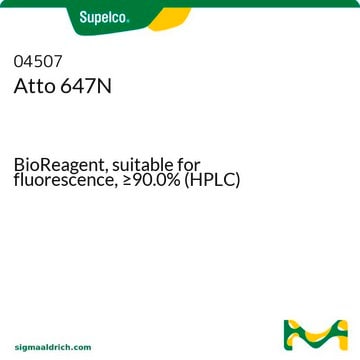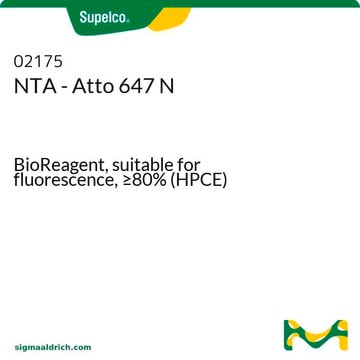18373
Atto 647N NHS ester
BioReagent, suitable for fluorescence, ≥90% (HPLC)
Se connecterpour consulter vos tarifs contractuels et ceux de votre entreprise/organisme
About This Item
Produits recommandés
Gamme de produits
BioReagent
Pureté
≥90% (HPLC)
≥90% (degree of coupling)
Forme
solid
Fabricant/nom de marque
ATTO-TEC GmbH
λ
in ethanol (with 0.1% trifluoroacetic acid)
Absorption UV
λ: 641-647 nm Amax
Adéquation
suitable for fluorescence
Température de stockage
−20°C
Catégories apparentées
Description générale
Atto 647N is a superior red-emitting fluorescence dye with a strong absorption, excellent fluorescence quantum yield (65%), high photostability, excellent ozone resistance, good solubility, and very little triplet formation.
Application
Atto 647N belongs to a new generation of fluorescent labels for the red spectral region. The dye is designed for application in the area of life science, e.g. labeling of DNA, RNA or proteins. Characteristic features of the label are strong absorption, excellent fluorescence quantum yield, high photostability, excellent ozone resistance, good solubility, and very little triplet formation. Atto 647N is a cationic dye. The active ester of Atto 647N fluorescence dye reacts with amino groups under mild conditions. After coupling to a substrate the dye carries a net electrical charge of +1. In common with most Atto-labels, absorption and fluorescence are independent of pH in the range of 2 to 11, used in typical applications. As supplied Atto 647N consists of a mixture of two isomers with practically identical absorption and fluorescence properties.
Informations légales
This product is for Research use only. In case of intended commercialization, please contact the IP-holder (ATTO-TEC GmbH, Germany) for licensing.
Produit(s) apparenté(s)
Réf. du produit
Description
Tarif
Code de la classe de stockage
11 - Combustible Solids
Classe de danger pour l'eau (WGK)
WGK 3
Équipement de protection individuelle
Eyeshields, Gloves, type N95 (US)
Certificats d'analyse (COA)
Recherchez un Certificats d'analyse (COA) en saisissant le numéro de lot du produit. Les numéros de lot figurent sur l'étiquette du produit après les mots "Lot" ou "Batch".
Déjà en possession de ce produit ?
Retrouvez la documentation relative aux produits que vous avez récemment achetés dans la Bibliothèque de documents.
Les clients ont également consulté
Jialei Tang et al.
Scientific reports, 7(1), 10945-10945 (2017-09-10)
We report a simple single-molecule fluorescence imaging method that increases the temporal resolution of any type of array detector by >5-fold with full field-of-view. We spread single-molecule spots to adjacent pixels by rotating a mirror in the detection path during
Shangguo Hou et al.
Nature communications, 11(1), 3607-3607 (2020-07-19)
To date, single molecule studies have been reliant on tethering or confinement to achieve long duration and high temporal resolution measurements. Here, we present a 3D single-molecule active real-time tracking method (3D-SMART) which is capable of locking on to single
Ioannis Sgouralis et al.
The journal of physical chemistry. B, 123(3), 675-688 (2018-12-21)
We develop a Bayesian nonparametric framework to analyze single molecule FRET (smFRET) data. This framework, a variation on infinite hidden Markov models, goes beyond traditional hidden Markov analysis, which already treats photon shot noise, in three critical ways: (1) it
Jennifer Z Yao et al.
Journal of the American Chemical Society, 134(8), 3720-3728 (2012-01-14)
Methods for targeting of small molecules to cellular proteins can allow imaging with fluorophores that are smaller, brighter, and more photostable than fluorescent proteins. Previously, we reported targeting of the blue fluorophore coumarin to cellular proteins fused to a 13-amino
Volker Westphal et al.
Science (New York, N.Y.), 320(5873), 246-249 (2008-02-23)
We present video-rate (28 frames per second) far-field optical imaging with a focal spot size of 62 nanometers in living cells. Fluorescently labeled synaptic vesicles inside the axons of cultured neurons were recorded with stimulated emission depletion (STED) microscopy in
Notre équipe de scientifiques dispose d'une expérience dans tous les secteurs de la recherche, notamment en sciences de la vie, science des matériaux, synthèse chimique, chromatographie, analyse et dans de nombreux autres domaines..
Contacter notre Service technique




